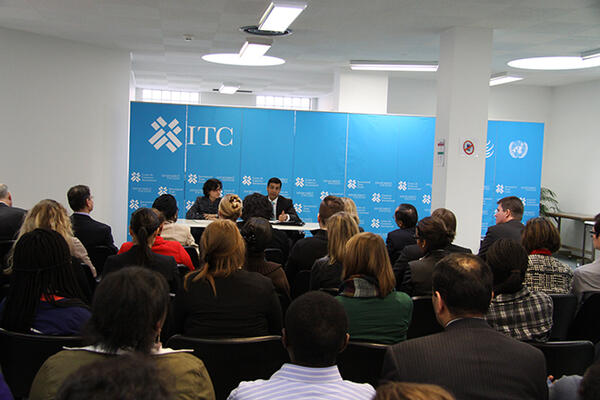
Historias
Transformar a los países sin litoral en economías conectadas por vía terrestre (en)
27 febrero 2014
Top UN official says ITC can offer Aid for Trade to assist poor countries
Landlocked developing countries (LLDCs) face major challenges including higher transportation and trade costs, and a lack of competitiveness, putting them at a disadvantage compared with coastal states. Mr. Gyan Chandra Acharya, Under-Secretary-General and High Representative for the Least Developed Countries, Landlocked Developing Countries and Small Island Developing States, made this point during his meeting in Geneva with the Executive Director of the International Trade Centre (ITC), Arancha González, on 19 February 2014.
Mr. Acharya said turning LLDCs into landlinked states requires hard and soft infrastructure development and better connectivity to benefit from trade opportunities. He said ITC can help LLDCs in addressing their constraints by supporting trade facilitation and improving the competitiveness of small and medium-sized enterprises (SMEs). This move will help LLDCs gain a foothold in the global economy. He emphasized the need for rapid and inclusive growth by helping LLDCs to overcome structural constraints and build support mechanisms for development. This is the way forward in poverty eradication, said Mr. Acharya.
Ms. González reaffirmed that the majority of ITC's assistance is focused on least developed countries (LDCs), LLDCs and small island developing states (SIDS) and that ITC had particular expertise in helping these economies, and their SMEs, to implement the Multilateral Trade Facilitation Agreement.
‘We believe in resource generation that supports entrepreneurship and sustainable development while addressing social, economic and environmental issues,’ said Ms. González. She said ITC’s work in SME competitiveness enables countries to diversify and develop their abilities to join value chains.
Addressing ITC staff in an interactive session afterwards, Mr. Acharya said: ‘Development cannot happen if countries are only reliant on the integration of economies in a globalized world without a focused national policy, good governance, capacity development in infrastructure, trade and finance, including access to energy.’
‘The promotion of the private sector brings about growth in trade and supports job creation, which will help countries to break out of the poverty trap,’ said Mr. Acharya. ‘Growth from enhancing productive capacities and supportive global policies, such as improved market access and removal of trade barriers, are vital.’
He commended ITC for its role in market development and improving the productive capacities and competitiveness of SMEs. Mr. Acharya stated that economic diversification has a strong impact on resilience, particularly for LLDCs, that are vulnerable to global volatility.
For LLDCs and SIDs, Mr. Acharya said many of them are heavily dependent on overseas development assistance. Trade, therefore, plays an important role in economic development, and ITC, he said, can contribute its expertise to help promote development and uplift lives.
Watch an interview of Mr. Acharya to learn more about the economic challenges that LLDCS and LDCs face, and ITC's role in addressing those challenges through job creation and poverty eradication.
Landlocked developing countries (LLDCs) face major challenges including higher transportation and trade costs, and a lack of competitiveness, putting them at a disadvantage compared with coastal states. Mr. Gyan Chandra Acharya, Under-Secretary-General and High Representative for the Least Developed Countries, Landlocked Developing Countries and Small Island Developing States, made this point during his meeting in Geneva with the Executive Director of the International Trade Centre (ITC), Arancha González, on 19 February 2014.
Mr. Acharya said turning LLDCs into landlinked states requires hard and soft infrastructure development and better connectivity to benefit from trade opportunities. He said ITC can help LLDCs in addressing their constraints by supporting trade facilitation and improving the competitiveness of small and medium-sized enterprises (SMEs). This move will help LLDCs gain a foothold in the global economy. He emphasized the need for rapid and inclusive growth by helping LLDCs to overcome structural constraints and build support mechanisms for development. This is the way forward in poverty eradication, said Mr. Acharya.
Ms. González reaffirmed that the majority of ITC's assistance is focused on least developed countries (LDCs), LLDCs and small island developing states (SIDS) and that ITC had particular expertise in helping these economies, and their SMEs, to implement the Multilateral Trade Facilitation Agreement.
‘We believe in resource generation that supports entrepreneurship and sustainable development while addressing social, economic and environmental issues,’ said Ms. González. She said ITC’s work in SME competitiveness enables countries to diversify and develop their abilities to join value chains.
Addressing ITC staff in an interactive session afterwards, Mr. Acharya said: ‘Development cannot happen if countries are only reliant on the integration of economies in a globalized world without a focused national policy, good governance, capacity development in infrastructure, trade and finance, including access to energy.’
‘The promotion of the private sector brings about growth in trade and supports job creation, which will help countries to break out of the poverty trap,’ said Mr. Acharya. ‘Growth from enhancing productive capacities and supportive global policies, such as improved market access and removal of trade barriers, are vital.’
He commended ITC for its role in market development and improving the productive capacities and competitiveness of SMEs. Mr. Acharya stated that economic diversification has a strong impact on resilience, particularly for LLDCs, that are vulnerable to global volatility.
For LLDCs and SIDs, Mr. Acharya said many of them are heavily dependent on overseas development assistance. Trade, therefore, plays an important role in economic development, and ITC, he said, can contribute its expertise to help promote development and uplift lives.
Watch an interview of Mr. Acharya to learn more about the economic challenges that LLDCS and LDCs face, and ITC's role in addressing those challenges through job creation and poverty eradication.



